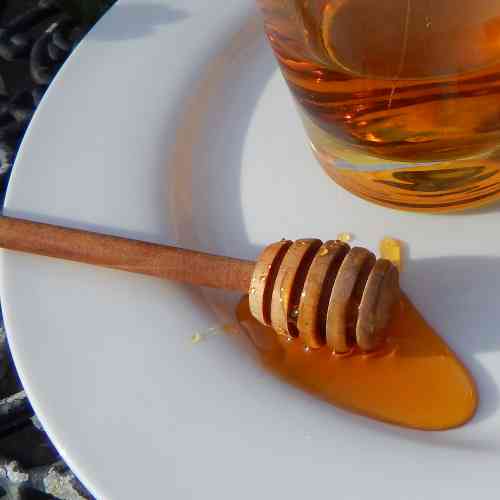Why Babies Can't Have Honey:
Honey And Infant Botulism
Date: 1st April 2020
Honey is a natural food and source of sugar, and you may be tempted to give a little honey to a baby, perhaps adding it to a little feed or drink. But the question is, can honey be given to infants?
The short answer is:
No – honey should never be fed to children younger than one year of age.
Why can't babies eat honey?
The reason for this is that very young babies are susceptible to a condition known as ‘botulism’, which could lead
to their death.
For further information and explanation, please read further.
Honey And Infant Botulism
Firstly, what is botulism? Botulism is a condition caused by a toxin produced by spores of the bacterium Clostridium botulinum. (As an aside, the Clostridium genus of bacteria contains a number of species that can cause disease in humans, including tetanus, and gastroenteritis.) Although botulism is very rare, it can be fatal, even in adults. The toxin affects the nervous system, leading to muscle weakness and even muscle paralysis.
Depending on the muscles most seriously affected in individual infants, this could lead to serious consequences or even death. For example, paralysis of the diaphragm could prevent an infant breathing independently, while weakness of the muscles used for feeding (such as the muscles used for sucking) could lead to inability to feed, which could very quickly lead to dehydration, starvation and death.
How can infants develop botulism after eating honey?
It is known that honey can contain organisms, and C. botulinum spores have been found in honey. If the honey ingested by an infant contains spores from C. botulinum, then the spores can develop in the intestinal tract of the infant and release toxin, which is absorbed in the intestine of the child, leading to botulism.

Why are infants more susceptible to
botulism than adults?
Younger infants (especially those under 6 months old) are particularly susceptible for three reasons:
- they have
insufficiently developed immune systems of their own in order to fight the
bacterial spores;
- they have insufficiently developed intestinal micro-flora (the micro-organisms such as bacteria that live in the human gut) of their own, which would competitively inhibit growth of C. botulinum;
- they have insufficiently high levels of bile acids, which inhibit growth of C. botulinum, and are known to be higher in adults.
Can I give honey to my baby if the honey has been cooked or heated first?
No. This is because botulism spores cannot be destroyed by home cooking methods, so your baby would still be at risk.
What are the symptoms of botulism in infants?
The most common and noticeable symptom of botulism poisoning in infants is muscle weakness – the child appearing to be ‘floppy’ (in fact, infant botulism is sometimes referred to as ‘floppy baby syndrome’!) or to have drooping eyelids, or an unusual cry.
One of the earliest symptoms is constipation, but this is often missed in infants.
Case studies of botulism in infants caused by eating honey
Here are two examples of unfortunate cases where babies suffered from botulism after eating honey:
A case report in the British Medical Journal in 2012 (BMJ Case Rep. 2012; 2012: bcr1120115153) by Abdulla et al outlined the case of a young girl who developed ‘general floppiness’ aged 3 months. Detailed investigation (including fecal samples from the child and sample from remnants of the honey that she had ingested) showed that the botulism was caused by the presence of the C. botulinum toxin contained in honey that had been added to the girl’s feed.
This case echoed another that was reported in Kuwait in 2006 (Med Princ Pract 2006;15:456–458) of a 6 week old male infant with signs of sepsis and progressive weakness. Similarly, in this case, fecal and honey samples showed an identical strain of C. botulinum.
When Can Babies Have Honey?
Babies may be given honey when they are older than 1 year old.
If you found this page helpful or interesting, I'd really be grateful if you would share it with others - if not this page, perhaps another, such as Gardening For Bees.
Thank you so much :) .
